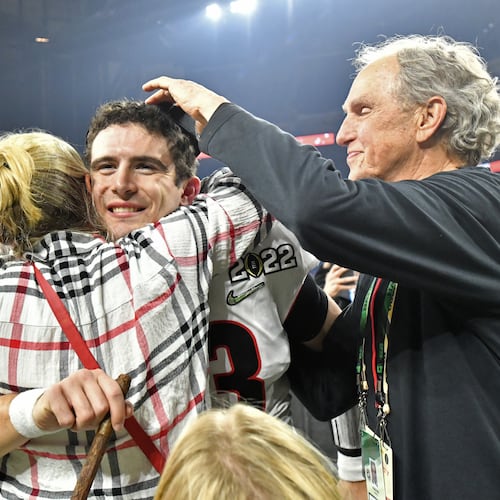AUGUSTA - The story goes that in 1975 when Lee Elder was about to cut his trail at the Masters, he first was faced with a thicket of racism outside the Augusta National gates, in the real world.
There was this restaurant in Augusta. It did not wish to seat Elder and his party. The reason was as evident as the color of Elder’s skin.
But such ugliness had a remedy. Elder found open arms and a bountiful table at nearby Paine College, a historically black institution four miles from the Masters front gate. When college president Julius Scott heard about the incident, he told Elder that all his meals for the rest of the week would be prepared by the university’s chefs.
“Dr. Scott kind of took us under his wing and took care of us,” Elder remember here 45 years later.
Monday, a little of the kindness flowed the other way. Here at the beginning of Masters week, Augusta National, which has a long relationship with Paine College, announced it was endowing two scholarships at the school in Elder’s name as well as financing the start-up of a women’s golf team at the college.
Further, the club announced it was going to recognize Elder’s historic standing as the first Black golfer to play the tournament by adding him to the ceremonial first tee shot of the 2021 Masters, joining Jack Nicklaus and Gary Player. Getting around with a cane now after injuring his knee in a fall, Elder, 86, said he dearly hoped to be recovered and swinging a club again by next April.
Here in this time of racial reckoning, such an announcement resonated with particular force. The topic of race and Augusta National has not always been a comfortable one. It’s beginnings are marked by the clear divide between a white membership and a black service staff. The club did not welcome its first African American member until 1990.
Long reported has been a quote attributed to club founder Clifford Roberts in which he said that as long as he lived “all the golfers would be white and all the caddies would be black.” And for so many years, nothing in how the club operated caused anyone to doubt those words.
After Elder beat Peter Oosterhuis on the fourth playoff hole in the Monsanto Open in Pensacola, Fla., it was Roberts who called him and issued a personal invitation to the following year’s Masters.
“I wish there had been other black players who came before me, qualified and played. I didn’t want it to take that long for someone to play here,” Elder said Monday. “But I’m very proud and happy I was the one that did this.”
“It’s what I wanted from the time I put the ball in the ground in 1967 to qualify and come to play on the PGA Tour,” he said. “I heard so much about the Masters from other players and I wanted the chance to come and see for myself if it was really the way it was.”
Elder didn’t play particularly well in 1975, shooting 74-78 and missing the cut in a year remembered for Jack Nicklaus holding off Johnny Miller and Tom Weiskopf to win a fifth green jacket.
A winner of four PGA Tour titles, Elder appeared in five other Masters between 1977-81, with a best finish of 17th. “We disappointed some people by not making the cut but came back the next five years and kind of made up for it,” Elder said.
For current Augusta National chairman Fred Ridley, the 45th anniversary of Elder’s Masters appearance falls at a most fitting time. “It comes during a year when racial justice and equality are at the forefront of our national discourse,” he said Monday. “At age 40, playing in the 39th Masters, Lee delivered a simple but strong message that resonated throughout the world. That message was unequivocal: ‘I belong.’”
It is an exceptional time when the chairman of a most exclusive golf club broaches anything of a racial theme. More and more it seems the Masters auditions for the role of golf’s better angel.
Of course, it can’t do that without having its own house in order.
There is no rewriting the exclusive history of places like Augusta National, but there is always the opportunity to correct it.
Tiger Woods, the player who rode the legacy of players like Elder to a ground-breaking 1997 Masters title (the first of five), was asked recently his thoughts on where Augusta National stood in coming to terms with its past.
“I think Augusta’s just like any other part of the world,” he said. “It has changed, it has evolved. Yes, it has had some roots that I don’t think that everyone’s very proud of, but it has evolved. We have minority members now, it’s more diverse. And just like anything, it evolves. And Augusta certainly has, and I’m sure it will continue.”
Thus, was Ridley asked Monday if he was satisfied that Augusta National’s push for diversity and inclusion in golf was reflected in its own membership.
His answer – keep in mind that the club refuses to divulge the makeup of its membership – was in the form of a promise.
“I don’t think satisfied would be the right word,” he said. "I don’t think one should ever be satisfied with any objective that you’re trying to accomplish because perfection is never attained.
“I would say that we do have a diverse membership. That has been an increasing fact over the past few years. It will continue to be an increasing fact during my chairmanship.”
About the Author
The Latest
Featured


